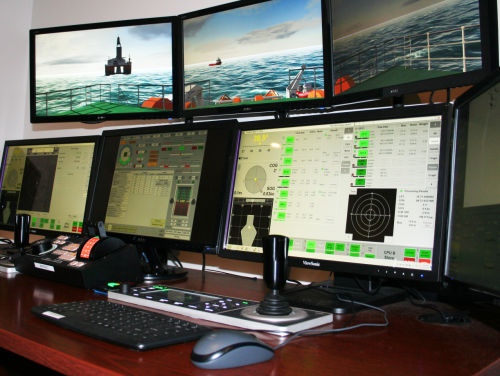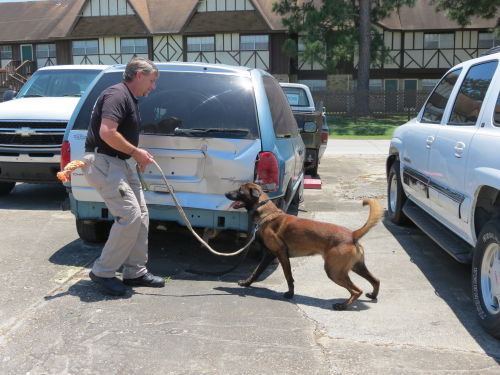
Center captains to stay in tune with industry’s latest technology
May 21, 2014
Lack of data costing port millions
May 21, 2014Searching for anything from marijuana, cocaine, heroin or Ecstasy, Houma’s newest K-9 investigator has received an increase in calls to search for illegal substances on offshore marine boats, in parking lots and at traffic stops.
Gus, a 2-year-old Belgian Malinois, works with his partner Toney Wade at Global Safety Training Services in Houma.
Wade said it has become more common for businesses to request their drug screening services, as well as narcotics searching abilities.
“Some weeks, we’ll do 12 to 14 jobs,” Wade said. “The average right now is in the four to six range.”
Gus began “very intensive” narcotics training at six weeks old. Belgian Malinois’ active behavior makes them the ideal breed for narcotics searches since “they are always ready to go,” Wade said. “He loves to work. That’s all he wants to do.” The breed is common among law enforcement agencies.
“What they typically do is associate the narcotics with a play toy,” Wade said about Gus’ training. “They take the toy and put it in the same container the drugs are in and it picks up the smell.”
When Gus gets to a site for a search, he wastes no time hunting for his “toy.”
Wade’s commitment to training Gus also meant he had to learn all of his commands in Dutch.
“They train them in Dutch so no one on the streets can give him commands that he would understand,” he said.
There are no differences in the narcotics searches conducted by Gus and the searches conducted by K-9 dogs with the sheriff’s office, except that Wade works as part of the private sector.
While Gus’s services have become a more frequent request from business owners looking to evade drugs from their employees or property, the demand for traditional urine drug testing and hair follicle testing remains in high demand.
Brandon Rhodes, a family nurse practitioner and owner of All Industrial Medical Services in Houma, said his company has programs in place to complete random drug testing on-site at different businesses.
On average, AIMS performs at least 300 to 400 drug screenings per week, with some companies testing as many as 180 employees at one time. Those numbers do not include the average number of screenings the company completes for pre-employment.
“There are more that pass than fail, but there is a large amount that do not pass,” Rhodes said. “You have boat captains that make very large amounts of money that end up failing drug screenings.”
Rhodes said his company also serves as a collection site for hair follicle testing, but those tests are “not nearly as popular as urine drug tests just because of the costs, and urine samples are more convenient.”
Steven Waguespack, president of the Louisiana Association of Business and Industry, said employers are becoming more comfortable with incorporating drug screenings into their monitoring efforts.
“Unfortunately in today’s society, drugs are more readily accessible to the general population so our employers need to ensure that is not coming into their workforce and also have to understand the impact it has on their workers,” he said.
Waguespack equated the use of drugs as a detriment to “soft skills,” which can mean a variety of different things to employers, but most often relates to an employee’s ability to show up for work on time and complete their job.
“I definitely think being able to stay off drugs is a component of soft skills,” he said. “It’s surprising the challenges employers face finding workers who can pass drug tests consistently.”
LABI supports business owners who initiate drug screenings at their discretion, and does not advocate the services be government mandated.
“Employers should have the autonomy to say what works best for their workforce,” he said.
At Bollinger Shipyards, identifying and preventing the presence of illegal drug use is seen as necessary to help reduce the number of workplace accidents and improve the overall health and safety of employees.
Ray Barker, company human resources director, said the company experiences difficulty finding reliable, skilled labor as a result of positive drug test results.
“Unfortunately, we lose good employees when tests indicate illegal or prescription drug abuse,” he said.
Well-known as a leader in maritime construction, boat repair and conversion products, Bollinger participates in random drug screenings to ensure their customers receive a certain level of quality work, Barker said.
The cost of not conducting drug tests would be more expensive for the company since they would have to spare the expense to rework projects and tend to employee accidents.
“We consider drug testing an effective way of protecting our skilled workforce by preventing accidents, lowering costs and providing excellent customer service,” Barker said.
LABI is supporting House Bill 505 this legislative session, which puts protection in place for employers who hire nonviolent offenders.
The bill “prohibits a cause of action from being brought against an employer, general contractor, premises owner or third party for negligent hiring or failing to adequately supervise an employee or independent contractor due to damages or injury caused by that employee solely because that employee has been previously convicted of a criminal offense.”
“We want to give employers some liability protection in order to go out and hire those workers,” Waguespack said. “It will help fill some of these open jobs and it’s a good way to make sure they don’t go back to jail.”
As companies continue to increase their efforts in search of reliable and skilled workers, local drug testing clinics are working to meet the demand.
Wade is currently training a female German Malinois, which should be ready to work in the field with Gus within a few weeks.
“It’s a big investment, but there’s demand for narcotics searches,” he said.
Rhodes’ business has seen tremendous growth since its inception five years ago, with two offices located in Houma and one expected to open in Houston.
“Houston is a main hub for hiring and a lot of our companies here have extensions of their offices in Houston and have requested us to open in that area,” Rhodes said. “It’s growing like crazy.”
Toney Wade works through a narcotics training exercise with Gus, a 2-year-old Belgian Malinois, at Global Safety Training Services in Houma. Wade said the demand for narcotics searches has increased, and he has purchased another Belgian Malinois for training to help field the increase in calls.











